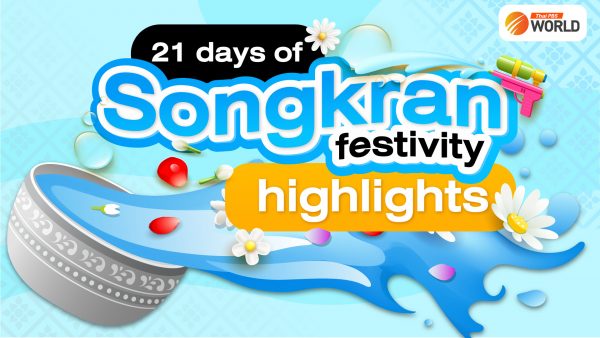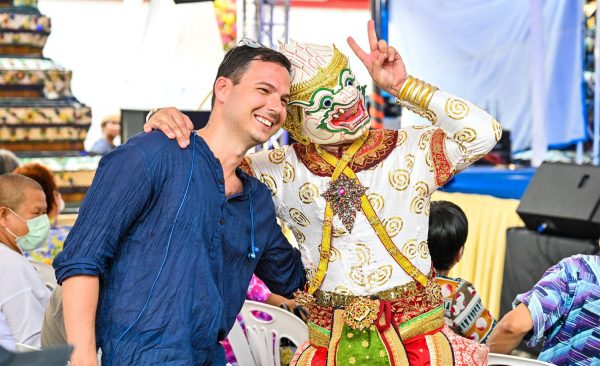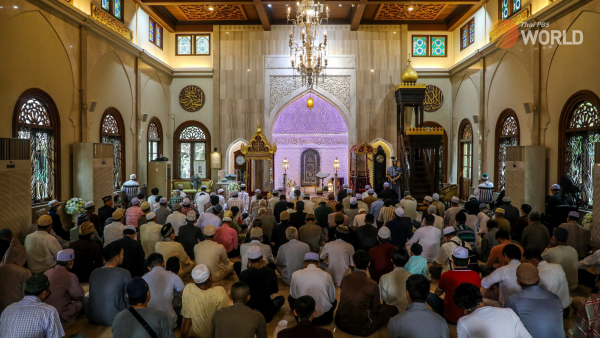Thais endure first-ever Songkran without family or fun

The traditional family get-together for the April 13-15 Songkran holiday is extra special for Krissana Pongbhai – April 14 is also her birthday.
However, this Thai New Year she will receive no flowers or cake or even youngsters pouring water on her hands. For the first time ever, the government has postponed the three-day holiday, as it seeks to prevent the mass movement of revellers. The aim is to curb the spread of the deadly Covid-19.
“Songkran is a period of happiness for me. But this year I’m a bit lonely, though I understand [the government’s decision]. If they [the relatives] had shown up, it would have been chaotic and there would be concerns of infection,” says the 82-year-old retired teacher, who lives in Bangkok.
Every Songkran, the Yasothorn-native usually hosts about 30 relatives who travel from upcountry to visit her. Staying true to her northeastern roots, Krissana cooks up a spread of Isaan favourites for them, like mee kathi (noodles with coconut curry) and kuay jab yuan (Vietnamese noodle soup).
“This year, I will miss tucking into the traditional feast and talking about the good old days,” she says.
With the Covid-19 crisis escalating, Krissana, who has lived in the capital for more than 60 years, realises she will not be able to enjoy being with her grandchildren this year. Last month she asked her eldest daughter to tell their relatives to stay away and offer New Year greetings by phone instead.
This is the first time that Thailand has missed Songkran. For Thais, the holiday signals the beginning of a new year – when people working in cities return home to reunite with their families and pay respect to their elders. The festival is marked with traditional rituals like rot nam dam hua, when young people pour water on the hands of their elders to express respect and gratitude and ask for their blessings, and bathing Buddha statues.
However, the government cancelled all celebrations this year and barred the public from gathering in large numbers or travelling back to their hometowns.
For some Thais this is a huge loss, yet most see it as a reality they have no option but to accept.
Having lived in Bangkok for 25 years now, this is only the second time that Jrinya Nilphaet, managing director at media firm Ji Je Ru Ni House, will not be able to pay a Songkran visit to her parents, who live in Lampang’s Muang district. Her mum and dad are in their 70s and at higher risk of infection and illness from Covid-19.
“My parents rang me last month and told me not to go. They are afraid that I will bring the deadly virus from Bangkok, which will place them and other family elders in danger,” Jrinya says, adding that village health volunteers recently inspected her parents’ home and asked if they had hosted visitors from Bangkok.
Although she accepts she won’t be able to seek her parents’ Songkran blessings this year, Jrinya is concerned about the Buddha bathing ceremony at the family home. She says she will have to leave the arrangements to someone else, and make up for it when she visits her parents as soon as the outbreak is over.
Similar concerns prevented Chularat, a Bangkok-based freelance writer, from picking up her mother and younger brother from Nakhon Ratchasima and driving them to their family home in Khon Kaen.
Since moving to Bangkok 30 years ago, Chularat has never missed the chance to celebrate Songkran with her family.
“I had every intention to [return home] this Songkran, but my mum asked if I would have to quarantine myself for 14 days once I got there,” says Chularat, speaking on condition that her surname is withheld.
“I know my mum will miss being reunited with the family, but a bigger concern is the risk of her catching the virus if we all come together,” she adds.
Songkran is the annual highlight for her family, when some 50 relatives travel from other provinces to pay their respects to the elders, bathe the family Buddha statues and honour their ancestors. However, every ritual is cancelled this year, she laments.
Bangkok stays dry
The world famous Songkran water battles on Silom and Khao San Road are also cancelled this year, which means many expats are missing out on the fun.
Samuel, an English-language teacher who has been living in Bangkok for 16 years now, says he used to spend Songkran getting soaked and sipping from cocktail buckets, but these days prefers to head to the beach or enjoy a gentler version of the water-splashing fun in Chiang Mai.
Aware of the threat of Covid-19 this year, the Briton said the fun-loving generosity of Thais during Songkran – marked by sharing drinks and food and spraying water – would have led to a huge surge in infections.
“I will stay in this month and hope to make up for it next year … or may be if things return to normal later in the year, we can hold a water festival when the government rearranges the holiday,” he says.
Meanwhile, the Department of Health is recommending that people receive blessings from their family seniors via the internet this year, or opt for online gifts, in order to prevent the spread of the virus.
Dr Panpimol Wipulakorn, director-general of the department, said people should give up on plans to return home and do rot nam dam hua virtually instead.
“Technology can bring people closer. They can convey their love and best wishes through video calls or other online channels,” she advises.
As for those at home, they must maintain a distance of one or two metres from their elderly family members as well as keep their faces covered at all times, the doctor says.
By Jintana Panyaarvudh






